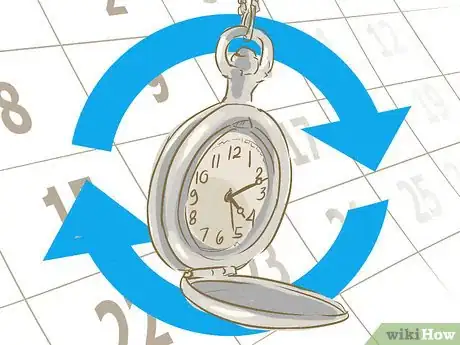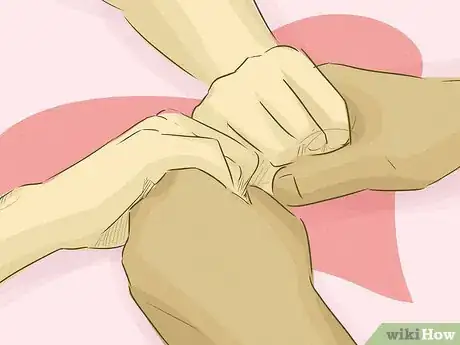This article was co-authored by Nicolette Tura, MA. Nicolette Tura is an Authentic Living Expert who operated her own wellness business for more than ten years in the San Francisco Bay Area. Nicolette is a 500-hour Registered Yoga Teacher with a Psychology & Mindfulness Major, a National Academy of Sports Medicine (NASM) certified Corrective Exercise Specialist, and is an expert in authentic living. She holds a BA in Sociology from the University of California, Berkeley and got her master's degree in Sociology from SJSU. She constantly draws from her own wounds and challenges; with her training in the healing arts and sociology, she offers potent content, powerful meditations, and game-changing seminars on inspiring elevation on a personal and corporate level.
wikiHow marks an article as reader-approved once it receives enough positive feedback. This article received 21 testimonials and 96% of readers who voted found it helpful, earning it our reader-approved status.
This article has been viewed 794,231 times.
The happiest, most satisfying relationships rest on a foundation of implicit trust. If you want your relationship to be all it can be, both of you must learn how to create this kind of trust. Most couples only think of trust in terms of being sexually faithful, though essential, there’s more to it than just that. [1]
Steps
Committing to Mutual Core Relationship Values
-
1Stay faithful. If a partner is not loyal, a relationship quickly becomes unworkable. People do recover from an affair but usually need professional help to do it. Make a commitment to be faithful and stick to it. If you’re not happy in the relationship, get counseling and not a part-time lover.[2]
- If you’re faithful to someone, it means you’re faithful on all levels. This means physically but also emotionally. Some people think it’s okay to establish intimate bonds even though they may just be spending time with another person and nothing else, but it’s really not. It will eventually cause problems in your relationship.
- Be clear with appropriate boundaries as much as possible. What is appropriate varies from culture to culture, and often with one's age. But it all comes down to understanding what is respectful, clear, and comfortable to ask from a romantic relationship.
- Dating a person once is not a committed relationship, for instance. If asking a person out on a date, make sure that is clear; it can be awkward, for example, if a woman is not entirely sure she is at a restaurant as a friend or as a date.
- Be clear on if you see your sexual relationship as more casual or more serious. Some people are comfortable with "booty calls" and "friends with benefits" types of relationships. Others see sexual relations as a very deeply emotional act done only with someone committed to a relationship (or after marriage).
- There are wide varieties of behaviors considered a "committed relationship," from traditional marriage, to "live-in partner", to more radical "open marriages," and polyamory. A person seeking a traditional marriage may be disappointed if the partner is looking for something else. Likewise, someone seeking something else may be disappointed if the partner is looking for a traditional marriage.
-
2Give your partner space, and foster kindness. Trust builds in an atmosphere of security and safety. The cycle of hurting each other, either verbally or physically, and then rejecting the other person, creates a lot of fear; which undermines trust. Furthermore, trying to control your partner’s every move is another type of mistrust, so make sure you’re not possessively clinging on to your partner. That will only push them away. [3]
- If your significant other wants to spend time with their friends, try to be okay with that. You can always talk about what’s acceptable behavior and what’s not, though. For instance, if your partner says that they want to go to a dance club with friends, and you’re not comfortable with it; then it’s something that you need to talk about, both in this instance, and for the future, so that it doesn’t keep happening again and again.
Advertisement -
3Love your partner without any ulterior motives. Both of you need to feel sure you are loved for yourself, and not for some other reason. Those other reasons could be your family, your money, your looks, or even just the fear of being alone. Make sure you’re with your significant other for the right reasons.[4]
-
4Make your relationship a top priority. It can be easy to take each other for granted and neglect one another. Try not to give all of your energy and time to other people or activities. Keep your priorities clear. If being in a relationship is important to you, then make sure it stays at the top of your list.[5]
- Avoid becoming a workaholic because this can get in the way of your relationship. Make time for your relationship; and if you need to reach a goal at a specific time, work with your partner to develop solutions.
-
5Stay to the end. Misunderstandings, conflict, and anger are going to occur. Make it safe for disagreements and the careful expression of anger to happen without raising a fear of abandonment. You do this by never using the threat of walking out.[6]
Establishing Trust on Your End
-
1Keep your routine. A lot of people believe that mixing things up all the time makes a great relationship. In other words, they are always planning something new to surprise the other. Although surprises are nice from time to time, stability and uniformity are far more important in a relationship. Uniformity sounds boring, but you need to be predictable to make things work in the long run. Predictability builds trust.
-
2Be reliable. Trust is just another way of saying you can rely on someone. You trust your partner to do certain things no matter what at all times. This trust builds security in a relationship. Make sure your partner can count on you.[7]
- If you say you’re going to be home by 5 p.m., then make sure you are or at least let the other person know if something else comes up. The most important factor here is consistency. If 4 out of 5 times, you never bother calling and just come home as late as you want, then that’s a strong indicator that your needs matter more to you than your partner. A happy, successful relationship is when both parties make an effort at keeping up their end of the bargain.
-
3Mean what you say. Your partner can read your face better than anyone else. If you are lying or trying to hide some true feeling by not quite saying all that is on your mind, they will be able to tell. The person might even think you’re cheating. When the person knows they can trust whatever comes out of your mouth without hesitation, then you are building an unshakable bond.[8]
-
4Tell the truth. Don't keep anything hidden, nothing should be privileged from the other. You have to know that sooner or later all things come to light, and the consequences of not being completely truthful will kill the trust and ruin your relationship.
-
5Share how you really feel.[9] Too many people never let their partners know what they need. Don't let your partner wonder, or try to guess what they should do for you. It is essential this happens with both partners. If only one partner is being catered to by the other, there is a chance one will feel smothered or the other might feel neglected. Either scenario is not good.
- Practice vulnerability to allow for more closeness and intimacy in your relationship.[10]
-
6Say no sometimes. It’s okay to listen to your partner’s needs and try to fulfill them, but sometimes it's just as valuable to say no. You can't do everything all the time, and you will actually earn some respect when you refuse to do something once in a while. Taking a stand, and imposing your own will can actually enhance the trust between you.
Fostering Trust in Your Significant Other
-
1Have faith in your partner's capabilities. In other words, if you believe at all that the person is not competent in some of the things they do, your trust will not be solid. If this is the case, you need to be upfront with them on the issues in an honest and loving manner. This will allow you to work through this and keep the trust with each other.
-
2Trust your partner. How can your partner trust you when you don't trust them? Having trust takes two people, and without the other person building trust, too, it's like a fish without water.
- This is where you have the opportunity to practice vulnerability. Trusting another person often comes down to how you feel on the inside. In other words, if you tend to be insecure about things, then this could fall over into your relationship in a negative way. You have every reason to trust until the person actually does something that shows you cannot.[11]
- Be open about any insecurities you may have. If you have any past experience with infidelity, let your partner know so they can understand what’s going through your head.[12]
-
3Give the benefit of the doubt.[13] One indicator of trust issues is the tendency to think of the worst case in every possible situation. Just because someone missed your phone call doesn’t mean the person is cheating on you. When you trust your partner, it means you give them the benefit of the doubt. Each person deserves a chance to explain themselves before coming to a conclusion. Only then can it be looked at objectively.[14]
-
4Leave your partner’s phone alone.[15] Do either one of you have passwords on your phone? If so, it could be a sign that you have problems with trust. While privacy is important, it doesn’t mean your phone should be protected like it’s Fort Knox. When there’s real trust, the other person will respect your privacy even if they have access to your phone. But the bigger issue, however, is if you feel that the person calling your significant other’s phone is a threat to your relationship, then there are definite trust issues that need to be dealt with.
-
5Allow your partner free reign in life. Often, when there are trust issues, you want to monitor everything the other person does and with whom. It’s easy to feel territorial and feel threatened by everyone. However, trust is about having faith and allowing the other person free reign. When you trust someone else, it also means you trust yourself, which fosters healthier relationships in the long run.[16]
Expert Q&A
Did you know you can get premium answers for this article?
Unlock premium answers by supporting wikiHow
-
QuestionCan you rebuild trust in a relationshop after it's broken?
 Kelli Miller, LCSW, MSWKelli Miller is a Psychotherapist based in Los Angeles, California. Kelli specializes in individual and couples therapy focusing on relationships, depression, anxiety, sexuality, communication, parenting, and more. Kelli also facilitates groups for those struggling with alcohol and drug addiction as well as anger management groups. She is the author of “Professor Kelli’s Guide to Finding a Husband” and the award-winning and best-selling book “Thriving with ADHD”. Kelli co-hosted an advice show on LA Talk Radio and is a relationship expert for The Examiner. She received her MSW (Masters of Social Work) from the University of Pennsylvania and a BA in Sociology/Health from the University of Florida.
Kelli Miller, LCSW, MSWKelli Miller is a Psychotherapist based in Los Angeles, California. Kelli specializes in individual and couples therapy focusing on relationships, depression, anxiety, sexuality, communication, parenting, and more. Kelli also facilitates groups for those struggling with alcohol and drug addiction as well as anger management groups. She is the author of “Professor Kelli’s Guide to Finding a Husband” and the award-winning and best-selling book “Thriving with ADHD”. Kelli co-hosted an advice show on LA Talk Radio and is a relationship expert for The Examiner. She received her MSW (Masters of Social Work) from the University of Pennsylvania and a BA in Sociology/Health from the University of Florida.
Psychotherapist
-
QuestionHow do couples build trust?
 Nicolette Tura, MANicolette Tura is an Authentic Living Expert who operated her own wellness business for more than ten years in the San Francisco Bay Area. Nicolette is a 500-hour Registered Yoga Teacher with a Psychology & Mindfulness Major, a National Academy of Sports Medicine (NASM) certified Corrective Exercise Specialist, and is an expert in authentic living. She holds a BA in Sociology from the University of California, Berkeley and got her master's degree in Sociology from SJSU. She constantly draws from her own wounds and challenges; with her training in the healing arts and sociology, she offers potent content, powerful meditations, and game-changing seminars on inspiring elevation on a personal and corporate level.
Nicolette Tura, MANicolette Tura is an Authentic Living Expert who operated her own wellness business for more than ten years in the San Francisco Bay Area. Nicolette is a 500-hour Registered Yoga Teacher with a Psychology & Mindfulness Major, a National Academy of Sports Medicine (NASM) certified Corrective Exercise Specialist, and is an expert in authentic living. She holds a BA in Sociology from the University of California, Berkeley and got her master's degree in Sociology from SJSU. She constantly draws from her own wounds and challenges; with her training in the healing arts and sociology, she offers potent content, powerful meditations, and game-changing seminars on inspiring elevation on a personal and corporate level.
Authentic Living Expert
Warnings
- Trust cannot be maintained if you are doing something behind your partner's back (e.g. cheating). Your partner will find out eventually and the trust will be broken. And once trust is gone, it can never be re-established, there will always be a bit of doubt in place of complete trust.⧼thumbs_response⧽
References
- ↑ http://www.care2.com/greenliving/5-kinds-of-trust-married-couples-need.html
- ↑ http://www.care2.com/greenliving/5-kinds-of-trust-married-couples-need.html
- ↑ http://www.care2.com/greenliving/5-kinds-of-trust-married-couples-need.html
- ↑ http://www.care2.com/greenliving/5-kinds-of-trust-married-couples-need.html
- ↑ http://www.care2.com/greenliving/5-kinds-of-trust-married-couples-need.html
- ↑ http://www.care2.com/greenliving/5-kinds-of-trust-married-couples-need.html
- ↑ http://leadingwithtrust.com/2013/09/01/five-ways-to-rapidly-increase-trust-in-your-relationships/
- ↑ http://leadingwithtrust.com/2013/09/01/five-ways-to-rapidly-increase-trust-in-your-relationships/
- ↑ Nicolette Tura, MA. Authentic Living Expert. Expert Interview. 23 January 2020.
- ↑ https://tinybuddha.com/blog/how-being-vulnerable-can-expand-your-world/
- ↑ Nicolette Tura, MA. Authentic Living Expert. Expert Interview. 23 January 2020.
- ↑ https://www.goodtherapy.org/blog/the-psychology-of-trust-issues-and-ways-to-overcome-them
- ↑ Nicolette Tura, MA. Authentic Living Expert. Expert Interview. 23 January 2020.
- ↑ http://elitedaily.com/dating/5-signs-trust-issues/836198/
- ↑ Nicolette Tura, MA. Authentic Living Expert. Expert Interview. 23 January 2020.
- ↑ Nicolette Tura, MA. Authentic Living Expert. Expert Interview. 23 January 2020.
About This Article
One of the most important things you can do to build trust in a relationship is always tell the truth. If you lie or keep things hidden from your partner, eventually the truth will come out and it will ruin any trust you had. In addition to being honest, you should try your best to be reliable by doing the things you say you'll do. For example, if you tell your partner you'll be home at a certain time, be home by then or let them know if you're running late. You should also make an effort to share your feelings with your partner and let them know if you're upset about something since being open with each other will help build trust. For more advice from our Counselor co-author, like how to learn to trust your partner, scroll down!














































































